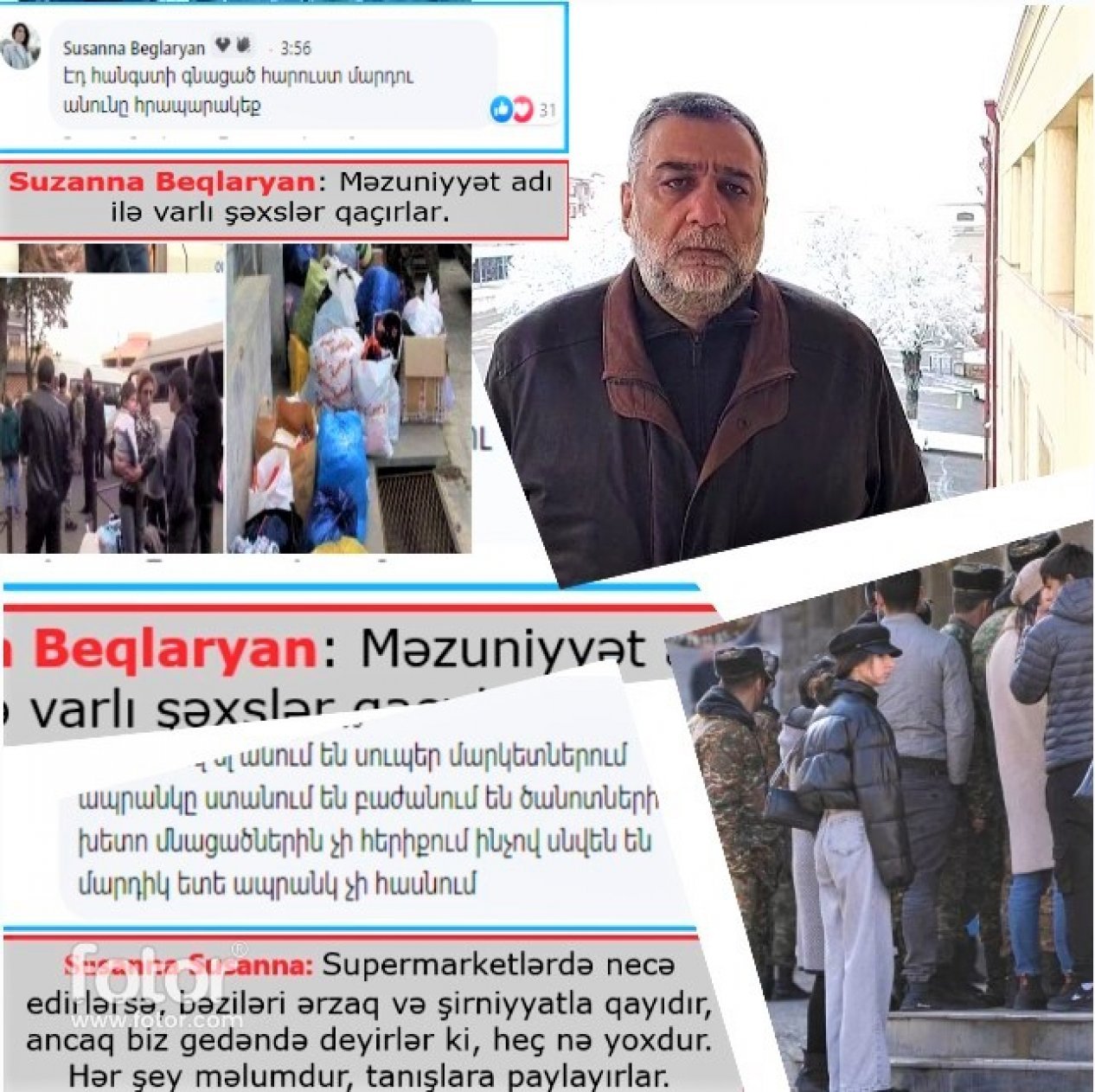
The spectacle of "hunger and food shortage" organized by the temporary illegal entity in the Karabakh economic region of Azerbaijan continues. Ruben Vardanyan, a Russian billionaire temporarily living in the territory of Azerbaijan, appealed to the people with whom he is ethnically related and said that he will switch to the "ration cards" regime from January 20 as a way out of the crisis. In his appeal, Vardanyan accused various businessmen of secretly distributing food, medicine, and fuel to their relatives and acquaintances and said that "smuggling" has become commonplace. Billionaire Ruben, the so-called official, admitted that there are enough reserves in Khankandi and the regions, reminding that food and medicine are distributed unevenly, and speculators allow scarcity and artificial price increase. He did not hesitate to accuse some wealthy people of leaving the "country" in such "difficult times." "We know that some wealthy families took advantage of their connections to go on 'vacation.'" source

Faktyokhla Lab investigated the opinions and comments of Armenians living in Khankandi on social networks after Ruben Vardanyan's appeal. It turned out that by expressing their protest, the residents actually exposed the "food and fuel show" in the city and surrounding regions, and in their comments on Vardanya's speech, they accused him of fraud, cowardice and hypocrisy.
Here are some of those comments.
Narina Israelyan, a resident of Khankandi, says, "Buying food for 2 liters of gasoline? Arrest these traders, if you can't do it, stop talking, you're making the people even more angry."

Armen Aghajanyan notes that some of his close acquaintances have easy access to cigarettes. Shop owners give cigarettes to their own people and hide them from others.

Manush Hovhannisyan, a Khankandi resident, describes the "scarcity" in the city's shops and demands from Vardanyan: "Please stop shop owners from selling goods to acquaintances, relatives and others. Products are sold secretly; they say there are no goods, but goods are brought from somewhere every day. I can't find sugar, pasta, butter for my three children."

Vahang Javadyan tells Vardanyan: "You know the names of the food traders, but you don't punish them. That's why this is happening today."
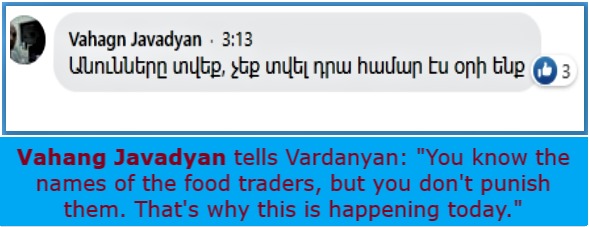
Susanna Susanna says: "Whatever they do in supermarkets, some come back with food and sweets, but when we go, they say there is nothing. Everything is clear; they distribute it to acquaintances."

Narine Beglaryan notes: "We are only interested in normal life and ways out, not war."

Tamara Tsatryan expressed her strong objection like this: "If you can't help, at least don't bother, go away, give us a chance."
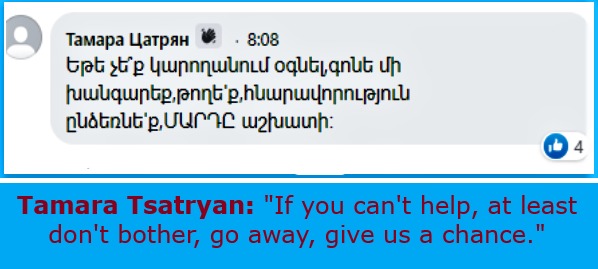
An Armenian activist named Tigran Petrosyan exposes Vardanyan's negligent "leadership": "You do not name the person who stole and sold 50 liters of gasoline, you are afraid of embarrassing them, you cannot stop wealthy families going on vacation and do not reveal their names. I do not accept this kind of cowardice. Vardanyan, this is Karabakh, be careful." source
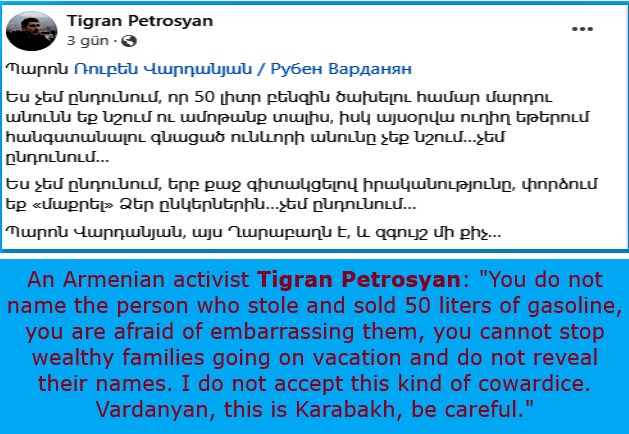
Apparently, the Armenians themselves admit that there is no shortage of meat, chicken, eggs, butter, bread and flour in the shops. However, fraudsters and speculators transfer food and medicine to their acquaintances or relatives, those who can afford it, but the poor cannot because the goods are sold at high prices.
After all these events, Vardanyan's transition to the food coupons is nothing more than a show, calculated only for the foreign audience.
Whom are food coupons for and in what quantity is the food?
The "Housing Issues Committee and Task Force" of the illegal entity said that after January 20, "ration cards" will be distributed to everyone with basic food items such as pasta, turkey, rice, buckwheat, sugar, sunflower oil, and butter. Each citizen will be given a "ration card" twice a month. The first "ration card" will be used from January 20 to February 5, and the second "voucher" from February 6 to February 20. Residents will get "ration cards" from the community and municipal leaders.
The food coupon provides 1 kg of meat, 1 kg of butter and 1 liter of vegetable oil, 1 kg of powdered sugar, 1 kg of pasta, 1 kg of rice, and buckwheat per month. Since there is no problem with fruits and vegetables, there is no need to sell them with coupons. Thus, a family of 4 will have 4 kg of each food, which is enough food for a family's normal nutrition. All this once again confirms that the stores will be supplied with sufficient monthly food for everyone.
All this raises a question: if Azerbaijan does not allow goods to pass through the Lachin-Khankandi road, how and from where will the food be brought after January 20?
Let's calculate: If one person is given 1 kg of each of 7-8 types of food during the month through a food coupon, it makes at least 7-8 kg of food. Armenians claim that "120,000" people live in the region, which is obviously a lie. Let's assume that that number of Armenians live there. Then, if each of 120,000 people is given 8 kg of food per month, the total amount of food is 960,000 kg (960 tons). This includes goods without a "ration card", for example, medicine, non-food items, etc. When we add them, a figure of about 1400-1500 tons a month emerges. That is, 50 tons of goods per day! When these goods are transported by a medium-sized truck with a carrying capacity of 5-6 tons, it means using 10 Kamaz or Ural trucks in one day. We do not mean the vehicles of Russian peacekeepers carrying construction and industrial goods, or passenger, ambulance and other vehicles here. This means that every day after January 20, 10 trucks should pass through the Lachin-Khankandi road to the areas where Armenians live in the Karabakh economic region, only to transport food and basic daily necessities. This fact itself exposes such nonsense as "blockade" and "humanitarian disaster."
Despite all this, Khankandi residents are still dissatisfied with Vardanyan's administration and blame him for the current uncertain situation. In the comments written on Vardanyan's profile, they clearly state that due to the deterioration of the situation, wealthy people are fleeing from Khankandi to Yerevan at night with the help of Russian peacekeepers.
Harut Mnatsakanyan says: "Vardanyan, take your family's apartments and business income and give them to the people. If you don't do this, the poor people who stay here will bribe the Russians and run away."
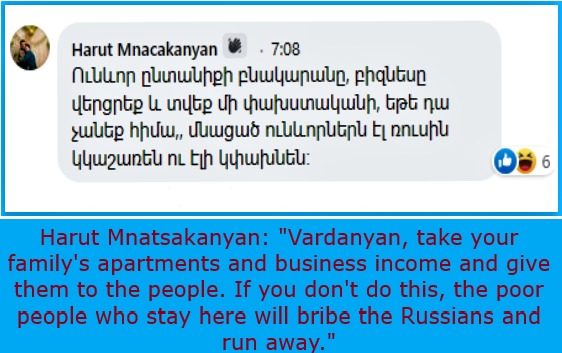
An Armenian woman named Susanna Beglaryan notes that rich people run away in the name of vacation.

A woman named Ruzanna Sahakyan says: "I wonder how long 90% of the population will believe and tolerate these promises. We don't think about nice words, we think about livelihood. The solution is to leave."
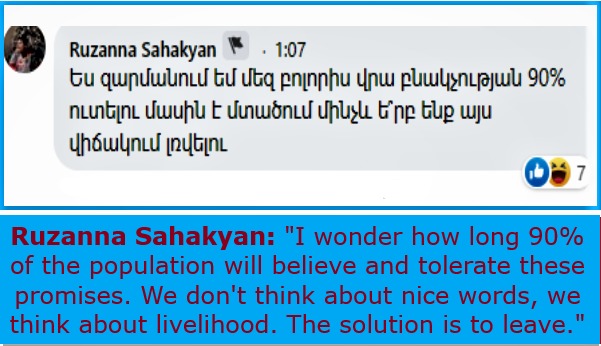
Undoubtedly, those comments are familiar to Vardanyan. Therefore, being afraid of the situation, he restricted banks from giving cash and set a limit on withdrawals from plastic cards to prevent the population's migration. From January 11, the daily limit for withdrawing money from ATMs and POS terminals in Khankandi and surrounding settlements has been set at 50,000 drams ($125). The goal is to prevent people from withdrawing cash from ATMs and leaving the area.
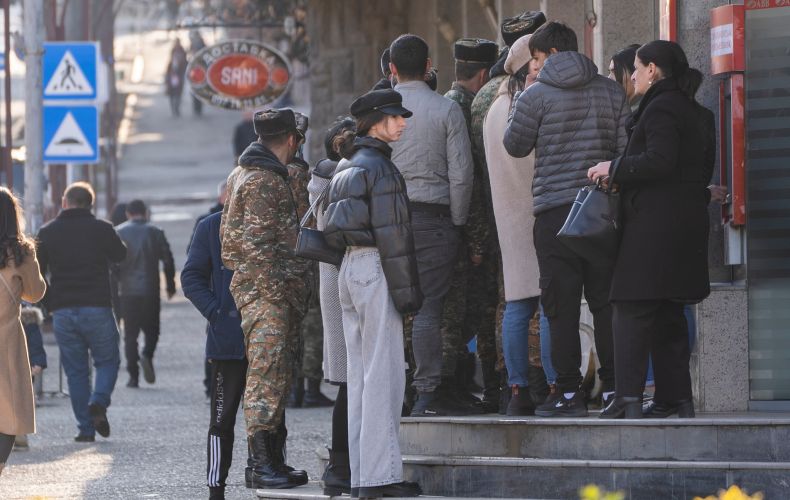
So, the situation in the territories under the temporary control of Russian peacekeepers in the Karabakh economic region of Azerbaijan is obvious. The reality is that wealthy Armenian families flee Karabakh by "alternative means" with the help of Russian peacekeepers. This is just the beginning of the initial effect of Ruben Vardanyan's show.
P.S. All the information mentioned in the article was prepared with reference to the sources and published without any additions. We simply don't reveal those sources for obvious reasons. Those who want to receive any further information can write in the comment section of our Telegram channel.




















